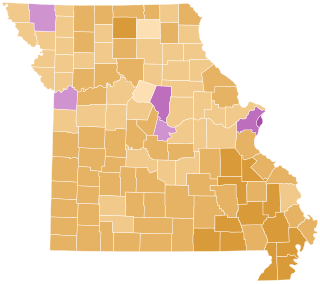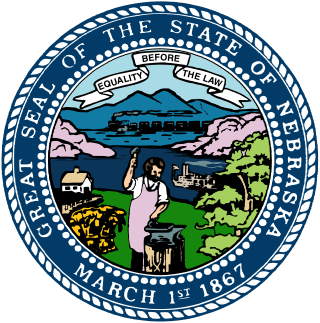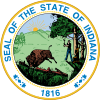
From January 3 to June 3, 2008, voters of the Democratic Party chose their nominee for president in the 2008 United States presidential election. Senator Barack Obama of Illinois was selected as the nominee, becoming the first African American to secure the presidential nomination of any major political party in the United States. However, due to a close race between Obama and Senator Hillary Clinton of New York, the contest remained competitive for longer than expected; neither candidate received enough pledged delegates from state primaries and caucuses to achieve a majority, without endorsements from unpledged delegates (superdelegates).

The 2008 Iowa Democratic presidential caucus occurred on January 3, and was the state caucuses of the Iowa Democratic Party. It was the first election for the Democrats of the 2008 presidential election. Also referred to as "the First in the Nation Caucus," it was the first election of the primary season on both the Democratic and Republican sides. Of the eight major Democratic presidential candidates, then-U.S. Senator Barack Obama of Illinois received the most votes and was ultimately declared the winner of the Iowa Democratic Caucus of 2008, making him the first African American to win the caucus and the first African American to win a primary state since Jesse Jackson in 1988. Former U.S. Senator John Edwards of North Carolina came in second place and then-U.S. Senator Hillary Clinton of New York finished third, though Clinton received more delegates than Edwards. Campaigning had begun as early as two years before the event.

The 2008 United States presidential election in Iowa took place on November 4, 2008, as part of the 2008 United States presidential election. Voters chose seven representatives, or electors to the Electoral College, who voted for president and vice president.

The 2008 Delaware Democratic presidential primary was held on Super Tuesday, February 5, 2008, and had a total of 15 delegates at stake. The winner in each of Delaware's subdivisions was awarded those subdivisions' delegates, totaling 10. Another five delegates were awarded to the statewide winner, Barack Obama. The 15 delegates represented Delaware at the Democratic National Convention in Denver, Colorado. Eight other unpledged delegates, known as superdelegates, also attended the convention and cast their votes as well.

The 2008 Illinois Democratic presidential primary took place on Super Tuesday, February 5, 2008, with 153 delegates at stake. Each of Illinois's 19 congressional districts was proportionally allocated to candidates who had received 15% or more of the vote in that district, totaling 100. Another 53 delegates were also proportionally allocated to candidates who had received 15% or more of the vote statewide. The 153 delegates represented Illinois at the Democratic National Convention in Denver, Colorado. Thirty-two other unpledged delegates, known as superdelegates, also attended the convention and cast their votes as well.

The 2008 Georgia Democratic presidential primary took place on Super Tuesday, February 5, 2008, and had a total of 87 delegates at stake. The winner in each of Georgia's 13 congressional districts was awarded all of that district's delegates, totaling 57. Another 30 delegates were awarded to the statewide winner, Barack Obama. The 87 delegates represented Georgia at the Democratic National Convention in Denver, Colorado. Sixteen other unpledged delegates, known as superdelegates, also attended the convention and cast their votes as well.

The 2008 Massachusetts Democratic presidential primary was held on Super Tuesday, February 5, 2008, and had a total of 93 delegates at stake. The winner in each of Massachusetts's 10 congressional districts was awarded all of that district's delegates, totaling 61. Another 32 delegates were awarded to the statewide winner, Hillary Clinton. The 93 delegates represented Massachusetts at the Democratic National Convention in Denver, Colorado. Twenty-six other unpledged delegates, known as superdelegates, also attended the convention and cast their votes as well. Hillary Clinton won despite Obama receiving endorsements from both senators, Ted Kennedy and John Kerry, and the Governor Deval Patrick.

The 2008 Missouri Democratic presidential primary took place on Super Tuesday, February 5, 2008, with 72 delegates at stake. The winner in each of Missouri's nine congressional districts was awarded all of that district's delegates, which totaled 47. Another 25 delegates were awarded to the statewide winner, Barack Obama. The 72 delegates represented Missouri at the Democratic National Convention in Denver, Colorado. Sixteen other unpledged delegates, known as superdelegates, also attended the convention and cast their votes as well.

The 2008 Connecticut Democratic presidential primary took place on Super Tuesday, February 5, 2008, with 48 delegates at stake. The winner in each of Connecticut's five congressional districts was awarded all of that district's delegates, totaling 31. Another 17 delegates were awarded to the statewide winner, Barack Obama. The 48 delegates represented Connecticut at the Democratic National Convention in Denver, Colorado. Twelve other unpledged delegates, known as superdelegates, also attended the convention and cast their votes as well.

The 2008 Arizona Democratic presidential primary took place on Super Tuesday, February 5, 2008, and had a total of 56 delegates at stake. The winner in each of Arizona's eight congressional districts was awarded all of that district's delegates, which totaled 37. Another 19 delegates were awarded to the statewide winner, Hillary Clinton. The 56 delegates represented Arizona at the Democratic National Convention in Denver, Colorado. Eleven other unpledged delegates, known as superdelegates, also attended the convention.

The 2008 Arkansas Democratic presidential primary took place on Super Tuesday, February 5, 2008, with 35 delegates at stake. The winner in each of Arkansas's four congressional districts was awarded all of that district's delegates, totaling 22. Another 13 delegates were awarded to the statewide winner, Hillary Clinton. The 35 delegates represented Arkansas at the Democratic National Convention in Denver, Colorado. Twelve other unpledged delegates, known as superdelegates, also attended the convention and cast their votes as well.

The 2008 Louisiana Democratic presidential primary took place on February 9, 2008, and had 56 delegates at stake. The winner in each of Louisiana's seven congressional districts was awarded all of that district's delegates, totaling 37. Another 29 delegates were awarded to the statewide winner, Barack Obama. The 56 delegates represented Louisiana at the Democratic National Convention in Denver, Colorado. Ten other unpledged delegates, known as superdelegates, also attended the convention and cast their votes as well.

The 2008 Nebraska Democratic presidential caucuses took place on February 9, 2008, where 24 of the state's 31 convention delegates were chosen. Like he did throughout many other states that held caucuses instead of primaries, Barack Obama won the Nebraska Democratic Caucus by more than a two-to-one margin of victory over Hillary Clinton. On May 13, 2008, the state also held a non-binding primary election which Obama also won but the margin of victory was considerably smaller.

The 2008 Mississippi Democratic presidential primary took place on March 11, 2008, with 33 delegates at stake. The winner in each of Mississippi's four congressional districts was awarded all of that district's delegates, totaling 22. Another 11 delegates were awarded to the statewide winner, Barack Obama. The 33 delegates represented Mississippi at the Democratic National Convention in Denver, Colorado. Seven other unpledged delegates, known as superdelegates, also attended the convention and cast their votes as well.

The 2008 Puerto Rico Democratic presidential primary took place on June 1, 2008. It was an open primary. Puerto Rico initially planned to hold caucuses, as was done in 2000 and 2004, on June 7, 2008. In December 2007, an error in the plan was discovered; the caucus date should have read June 1, 2008. Puerto Rico also decided to conduct a primary, rather than caucuses. Puerto Rico sent 55 pledged delegates to the 2008 Democratic National Convention. These delegates were allotted on a proportional basis. The territory's delegation also included eight unpledged "superdelegates". Puerto Rico also selected one unpledged add-on delegate. Selection of the unpledged add-on delegate occurred at the Assembly of the Democratic Party of the Commonwealth of Puerto Rico on June 21, 2008, in San Juan. Polls were open from 8:00 am to 3:00 pm, prevailing local time, Atlantic Standard Time (AST). Hillary Clinton won the primary.

The 2008 North Carolina Democratic presidential primary took place on May 6, 2008, one of the last primary elections in the long race for nomination between Barack Obama and Hillary Clinton. Obama won the primary.

The 2008 Kentucky Democratic presidential primary took place May 20, 2008, and had 51 delegates at stake. The winner in each of Kentucky's six congressional districts was awarded all of that district's delegates, totaling 34. Another 17 delegates were awarded to the statewide winner, Hillary Clinton. The 51 delegates represented Kentucky at the Democratic National Convention in Denver, Colorado. Nine other unpledged delegates, known as superdelegates, also attended the convention and cast their votes as well.

The 2008 Montana Democratic presidential primary took place on June 3, 2008, with 16 delegates at stake. Along with South Dakota, it was one of the last two elections in the 2008 Democratic Party Presidential Primary. The winner in Montana's at-large congressional district was awarded all of that district's delegates, which totaled 10. Another six delegates were awarded to the statewide winner, Barack Obama. The 16 delegates represented Montana at the Democratic National Convention in Denver, Colorado. Eight other unpledged delegates, known as superdelegates, also attended the convention.

The 2008 United States presidential election in Pennsylvania was part of the 2008 United States presidential election, which took place on November 4, 2008, throughout all 50 states and the District of Columbia. Voters chose 21 representatives, or electors to the Electoral College, who voted for president and vice president.

Presidential primaries and caucuses were organized by the Democratic Party to select the 4,051 delegates to the 2016 Democratic National Convention held July 25–28 and determine the nominee for President in the 2016 United States presidential election. The elections took place within all fifty U.S. states, the District of Columbia, five U.S. territories, and Democrats Abroad and occurred between February 1 and June 14, 2016. Between 2008 and 2020, this was the only Democratic Party primary in which the nominee had never been nor had ever become President of the United States. This was the first Democratic primary to nominate a woman for President.





















